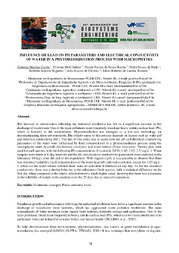Influence of lead on pH parameters and electrical conductivity of water in a phytoremediation process with macrophytes.
Influence of lead on pH parameters and electrical conductivity of water in a phytoremediation process with macrophytes.
Author(s): CORRÊA, G. M.; HUTHER, C. M.; ROCHA, N. P. de S.; MELO, P. S. de; RIGUEIRA, R. J.; OLIVEIRA, J. R. de; TAVARES, S. R. de L.
Summary: The increase in urbanization following the industrial revolution has led to a significant increase in the discharge of wastewater. One of the main pollutants most frequently found are heavy metals such as lead (Pb), which is harmful to the environment. Phytoremediation has emerged as a low-cost technology for decontaminating these environments. The effectiveness of this process depends on factors such as water pH and electrical conductivity (EC). The aim of this study was to assess how the pH and electrical conductivity parameters of the water were influenced by lead concentrations in a phytoremediation process using the macrophytes water hyacinth (Eichhornia crassipes) and water lettuce (Pistia stratiotes). Twenty pots were used for each species, with the following Pb concentrations: 0 (control); 0.033; 1.65; 2.65; 3.3; mg.L-1. Water samples were taken at 8-day intervals and the pH and electrical conductivity parameters were analyzed in the laboratory 80 days after the end of the experiment. With regard to pH, it was possible to observe that there was statistical variability in all concentrations of the water hyacinth cultivation solution, except for 1.65 mg.L- 1, while for the water lettuce solution there were no statistical differences on any day. As for the electrical conductivity, there was a similar behavior in the solutions of both species, with a statistical difference on the first day when compared to the others, which showed a much higher value, showing that there was a decrease in the solubility of metals in the medium over the 25 days due to natural evaporation.
Publication year: 2024
Types of publication: Paper in annals and proceedings
Unit: Embrapa Soils
Observation
Some of Embrapa's publications are published as ePub files. To read them, use or download one of the following free software options to your computer or mobile device. Android: Google Play Books; IOS: iBooks; Windows and Linux: Calibre.
Access other publications
Access the Agricultural Research Database (BDPA) to consult Embrapa's full library collection and records.
Visit Embrapa Bookstore to purchase books and other publications sold by Embrapa.

